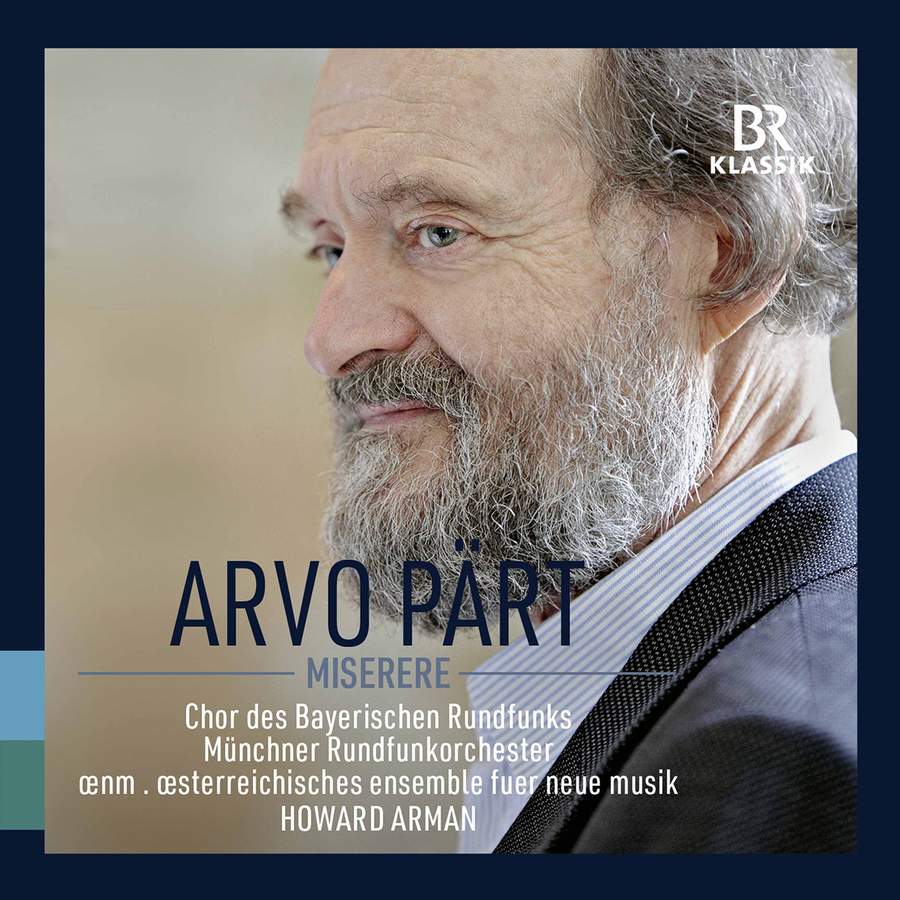PÄRT Miserere (Arman)
View record and artist detailsRecord and Artist Details
Genre:
Vocal
Label: BR Klassik
Magazine Review Date: 07/2021
Media Format: CD or Download
Media Runtime: 72
Mastering:
DDD
Catalogue Number: 900527

Tracks:
| Composition | Artist Credit |
|---|---|
| ...which was the son of... |
Arvo Pärt, Composer
Chor des Bayerischen Rundfunks Howard Arman, Conductor |
| Festina lente |
Arvo Pärt, Composer
Howard Arman, Conductor Munich Radio Orchestra Uta Jungwirth, Harp |
| Tribute to Caesar |
Arvo Pärt, Composer
Chor des Bayerischen Rundfunks Howard Arman, Conductor |
| Sequentia |
Arvo Pärt, Composer
Alexander Fickel Howard Arman, Conductor Munich Radio Orchestra Stanko Madić, Violin |
| (The) Deer's Cry |
Arvo Pärt, Composer
Chor des Bayerischen Rundfunks Howard Arman, Conductor |
| Miserere |
Arvo Pärt, Composer
Andrew Lepri Meyer, Tenor Anna-Maria Palii, Soprano Austrian Ensemble for New Music (OENM) Benno Schachtner, Alto Chor des Bayerischen Rundfunks Howard Arman, Conductor Moon Yung Oh, Tenor Thomas Hamberger, Bass |
| And I heard a voice... |
Arvo Pärt, Composer
Chor des Bayerischen Rundfunks Howard Arman, Conductor |
Author: Ivan Moody
No, of course we don’t need another recording of choral music by Arvo Pärt. Or so one might have thought: hearing this particular album practically guarantees a change of mind in this respect. The first thing to strike the listener is the creamily rich choral sound, which, while absolutely not lacking in precision, adds an extra dimension in works such as the opening Which was the son of … that some other outstanding ensembles, even when seasoned interpreters of the composer’s work, cannot match.
Neither is this all. Interspersed between the choral pieces are instrumental works all too easily overlooked: the impact of Sequentia and Festina lente in this context is quite different from that made when heard as part of a purely instrumental sequence, and the wonderful resonance of the orchestra’s sound is captured magnificently here. That most of these performances were recorded in the circumstances of the current pandemic seems to lend them an increased relevance and urgency.
But the centre of the recording is the Miserere, a work I have long thought deserving of more attention both in concert and in the recording studio. Its time-defying implorations for mercy are brutally cut through by verses from the ‘Dies irae’, and it is in many respects a surprising piece if one is unfamiliar with the composer’s earlier, pre-‘tintinnabuli’ music. There is of course the classic recording by the Hilliard Ensemble (ECM, 1/92), but any admirer of the work will be keen to have this new version, so immediate is its impact and so impressive its sonic depth. It is also in many respects a piece that confronts, so to speak, Pärt past with Pärt present, and in so doing demonstrates the unity and consistency of his musical thinking through the decades.
I have but one complaint about this recording: it is staggeringly under-documented. The booklet has plenty of room for information about the pieces themselves, and performances of such high quality as these I would have thought guaranteed to arouse the listener’s curiosity.
Discover the world's largest classical music catalogue with Presto Music.

Gramophone Digital Club
- Digital Edition
- Digital Archive
- Reviews Database
- Full website access
From £8.75 / month
Subscribe
Gramophone Full Club
- Print Edition
- Digital Edition
- Digital Archive
- Reviews Database
- Full website access
From £11.00 / month
Subscribe
If you are a library, university or other organisation that would be interested in an institutional subscription to Gramophone please click here for further information.




